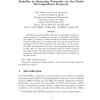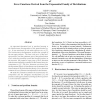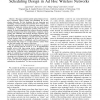5 search results - page 1 / 1 » Stability in Queueing Networks via the Finite Decomposition ... |
APJOR
2008
13 years 9 months ago
2008
Determination of the stability behavior of a queueing network is an important part of analyzing such systems. In Gamarnik and Hasenbein (2005) it is shown if a fluid network has t...
GLOBECOM
2006
IEEE
14 years 3 months ago
2006
IEEE
Abstract— In this paper, we analyze the throughput of interconnection networks, viewed as multi-stage queueing networks with infinite input queues, but finite internal cross-st...
ICPR
2000
IEEE
14 years 10 months ago
2000
IEEE
An important theoretical tool in machine learning is the bias/variance decomposition of the generalization error. It was introduced for the mean square error in [3]. The bias/vari...
INFOCOM
2006
IEEE
14 years 3 months ago
2006
IEEE
Abstract— This paper considers jointly optimal design of crosslayer congestion control, routing and scheduling for ad hoc wireless networks. We first formulate the rate constrai...
CDC
2010
IEEE
13 years 4 months ago
2010
IEEE
Most existing work uses dual decomposition and subgradient methods to solve Network Utility Maximization (NUM) problems in a distributed manner, which suffer from slow rate of con...



